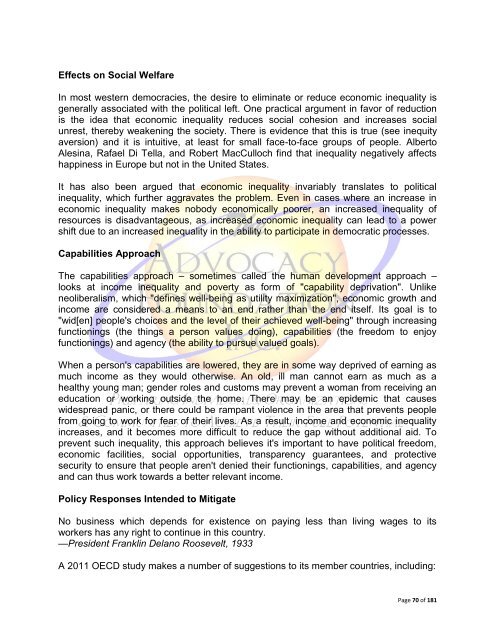Create successful ePaper yourself
Turn your PDF publications into a flip-book with our unique Google optimized e-Paper software.
Effects on Social Welfare<br />
In most western democracies, the desire to eliminate or reduce economic inequality is<br />
generally associated with the political left. One practical argument in favor of reduction<br />
is the idea that economic inequality reduces social cohesion and increases social<br />
unrest, thereby weakening the society. There is evidence that this is true (see inequity<br />
aversion) and it is intuitive, at least for small face-to-face groups of people. Alberto<br />
Alesina, Rafael Di Tella, and Robert MacCulloch find that inequality negatively affects<br />
happiness in Europe but not in the United States.<br />
It has also been argued that economic inequality invariably translates to political<br />
inequality, which further aggravates the problem. Even in cases where an increase in<br />
economic inequality makes nobody economically poorer, an increased inequality of<br />
resources is disadvantageous, as increased economic inequality can lead to a power<br />
shift due to an increased inequality in the ability to participate in democratic processes.<br />
Capabilities Approach<br />
The capabilities approach – sometimes called the human development approach –<br />
looks at income inequality and poverty as form of "capability deprivation". Unlike<br />
neoliberalism, which "defines well-being as utility maximization", economic growth and<br />
income are considered a means to an end rather than the end itself. Its goal is to<br />
"wid[en] people's choices and the level of their achieved well-being" through increasing<br />
functionings (the things a person values doing), capabilities (the freedom to enjoy<br />
functionings) and agency (the ability to pursue valued goals).<br />
When a person's capabilities are lowered, they are in some way deprived of earning as<br />
much income as they would otherwise. An old, ill man cannot earn as much as a<br />
healthy young man; gender roles and customs may prevent a woman from receiving an<br />
education or working outside the home. There may be an epidemic that causes<br />
widespread panic, or there could be rampant violence in the area that prevents people<br />
from going to work for fear of their lives. As a result, income and economic inequality<br />
increases, and it becomes more difficult to reduce the gap without additional aid. To<br />
prevent such inequality, this approach believes it's important to have political freedom,<br />
economic facilities, social opportunities, transparency guarantees, and protective<br />
security to ensure that people aren't denied their functionings, capabilities, and agency<br />
and can thus work towards a better relevant income.<br />
Policy Responses Intended to Mitigate<br />
No business which depends for existence on paying less than living wages to its<br />
workers has any right to continue in this country.<br />
—President Franklin Delano Roosevelt, 1933<br />
A 2011 OECD study makes a number of suggestions to its member countries, including:<br />
Page 70 of 181

















